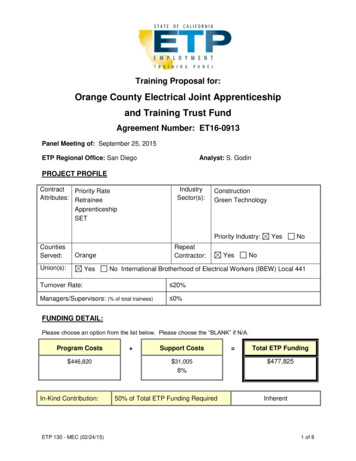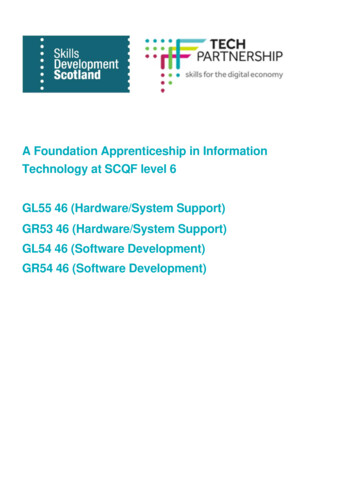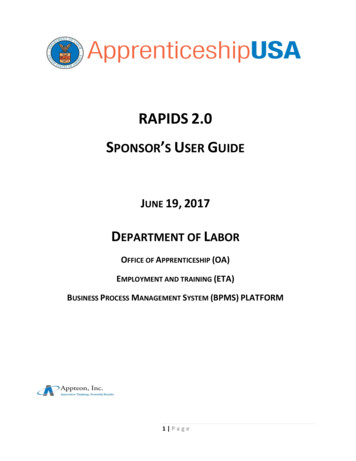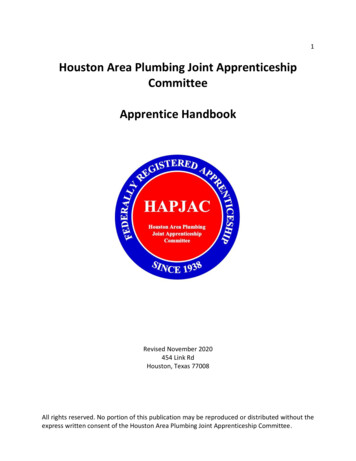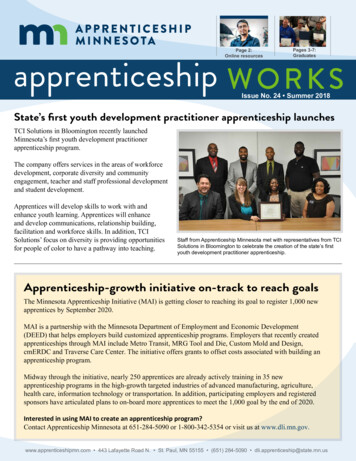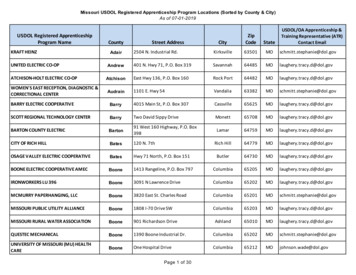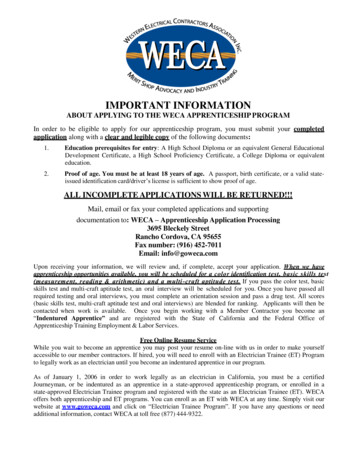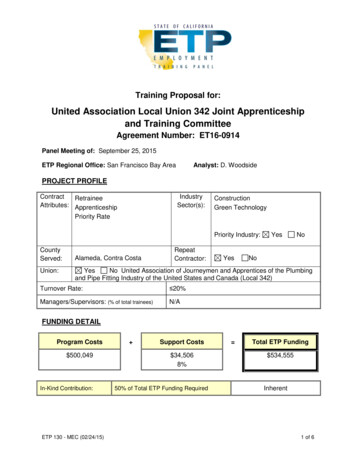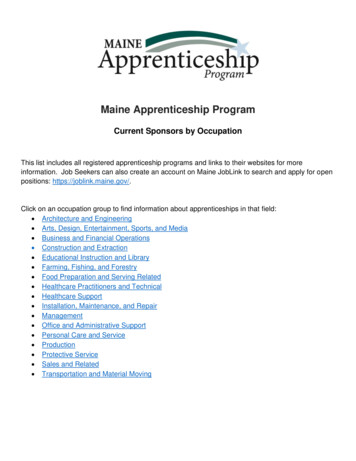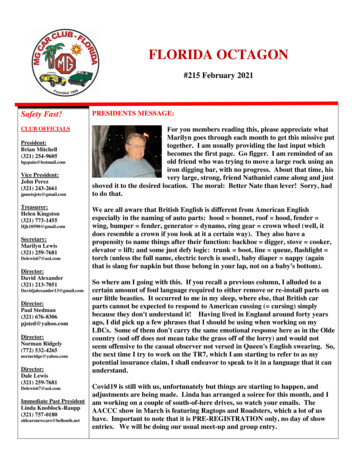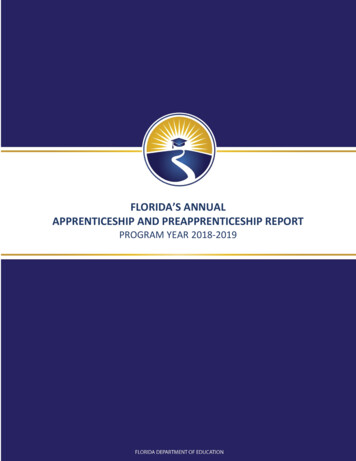
Transcription
FLORIDA’S ANNUALAPPRENTICESHIP AND PREAPPRENTICESHIP REPORTPROGRAM YEAR 2018-2019
FLORIDA’S ANNUAL APPRENTICESHIP AND PREAPPRENTICESHIPREPORT FOR PROGRAM YEAR 2018-2019In January 2019, Governor Ron DeSantis issued Executive Order 19-31 to chart a course forFlorida to become number 1 in the nation for workforce education by 2030. Registeredapprenticeship and preapprenticeship training programs are a key component of Florida’svision to ensure Florida has the best, most qualified workforce and that Florida’s students havethe opportunity to gain advanced skills and knowledge to find meaningful work and enjoyproductive careers.On the heels of that historic executive order, the Florida Legislature enhanced statutesgoverning registered apprenticeship with the passage of House Bill 7071. It included a provisionthat, by September 1 of each year, the FDOE publish an annual report on key fiscal, enrollment andprogrammatic aspects of Florida’s registered apprenticeship and preapprenticeship programs. Thisreport provides a retrospective look at the 2018-2019 program year and details keyaccomplishments related to participation and outcomes and federal and state investments inregistered apprenticeship and preapprenticeship programs.An Overview of Registered Apprenticeship and Preapprenticeship in FloridaRegistered ApprenticeshipRegistered Apprenticeship is an employer-driven, on-the-job workforce educational trainingprogram that connects job seekers looking to learn new skills and career opportunities withemployers looking to create a pipeline of highly skilled individuals for their workforce. Throughthe implementation of a registered apprenticeship training and education model, employerscan apply nationally recognized industry standards for apprentices, resulting in increasedproductivity, improving the quality of their workforce, retention of company knowledge, andreduction in turnover.The key components of a Florida registered apprenticeship program are as follows: Registration of program standards of apprenticeship with the FDOE for federal purposes;Business Involvement – employers are the foundation of every Florida-registered apprenticeshipprogram;Structured on-the-job training (OJT) - Apprentices receive OJT from an experiencedjourneyworker/mentor;Related technical instruction (RTI) - Apprentices combine OJT learning with RTI at FloridaCollege System (FCS) institutions, school district technical colleges, apprenticeship trainingschools, union training facilities, or at the employer’s facility and can be delivered in aclassroom, on-line, correspondence, or any combination thereof;Guaranteed wage structure – Apprentices receive increases in wages as their skill levels andknowledge increase;
Nationally recognized occupational credential – The successful completion of a registeredapprenticeship program results in a nationally recognized credential issued by the FDOE, whichconfirms for potential future employers that the apprentice is fully qualified for the job; andApprentices who complete a Florida-registered apprenticeship program may be accepted bytheir respective industry as a journey worker.The key roles of those participating in a registered apprenticeship program are clearly definedand consist of the following:Program sponsors – Sponsors are responsible for the administration of all aspects of aregistered apprenticeship program. This can include, but is not limited to: administrative,outreach, education liaison, registrar, records management, apprenticeship committeeadministrator, compliance and quality assurance, complaints, etc. The following are examplesof entities that may serve in the role of a program sponsor: Single employer;Trade association;Group of employers;Local workforce board;A public or private education provider;Community or faith-based organization; orAny other entity that complies with federal and state regulations.Employers - These are the drivers of registered apprenticeship and are actively engaged by andthrough its own employees in the actual work of the occupation being apprenticed. Theresponsibility to hire, employ, and pay the progressive wage structure of the apprentice and thewages of the journeyworker/mentor training the apprentice rests with the employer.Employers also determine how the required RTI will be delivered and by whom.For some employers, starting a registered apprenticeship program may not be the best option.Instead, it may make sense to join an existing registered apprenticeship program as aparticipating employer. All it takes is for an employer to execute a single-page “ParticipatingEmployer Agreement” with the program sponsor and agree to abide by the trainingexpectations set by the program sponsor for the apprentices. Participating employers benefitbecause all the paperwork and administrative duties are taken care of by the program sponsor.To become a participating employer in an existing registered apprenticeship program,employers should contact the apprenticeship training representative in their region foradditional information and help determine which registered apprenticeship program best fitstheir particular occupation and training needs. (See the FDOE Resource Summary for RegisteredApprenticeship section for more information on assistance and support provided by the FDOE.)Apprentices - These are individuals who are at least 16 years of age and who have entered intoan apprenticeship agreement with a registered apprenticeship sponsor. They are a hiredemployee of the participating employer in an “earn while you learn” model and engaged inlearning the apprenticeable occupation through actual supervised work experience.
Apprentices enjoy the benefit of obtaining tangible, marketable skills through the tutelage ofqualified journeyworkers/mentors in their field and working for an employer who has alreadyinvested in their success.Every apprenticeship program registered with the FDOE is automatically recognized by the U.S.Department of Labor (USDOL) for federal purposes. This provides apprentices with credibilityand marketability when they successfully complete their registered apprenticeship programfrom a nationally recognized program with a nationally recognized credential. This also givesregistered apprentices the opportunity for mobility. According to the USDOL, Florida is ranked10th amongst all the states and territories for the number of new apprentices, 13th for thetotal number of apprentices, and 15th for the number of successful completers.Registered PreapprenticeshipPreapprenticeship is designed to prepare individuals to enter and succeed in a registeredapprenticeship program. These programs promote a diverse and skilled workforce and prepareparticipants to meet the basic qualifications for entry into a registered apprenticeship program,through: An approved training curriculum based on industry standards,Academic and technical instruction and career services,Hands-on training in a simulated lab experience or through volunteer opportunities, andAssistance in applying to registered apprenticeship programs.Registered preapprenticeship is authorized in section 446.052 Florida Statutes and Rule 6A23.010, Florida Administrative Code and defined as an organized program of instruction offeredin a public school system or elsewhere and is designed to prepare a person 16 years of age orolder to become an apprentice. Preapprenticeship programs are registered with the FDOE andsponsored by a registered apprenticeship program. The program sponsors determine thelength and breadth of knowledge needed to properly prepare individuals for becomingapprentices. Some programs incorporate OJT into the program while others focus on RTIdelivered in a classroom or laboratory setting. These programs function as a pathway intoregistered apprenticeship. (See the Pathways to Apprenticeship section.)Management and Oversight of Registered Apprenticeship and PreapprenticeshipThe USDOL recognizes the FDOE as the authorized registration agency of apprenticeshipprograms and apprentices for federal purposes as found in Federal Regulation 29-CFR-29.13 –Recognition of State Apprenticeship Agencies. The Division of Career and Adult Education,Apprenticeship Section oversees the day-to-day management of Florida’s registeredapprenticeship programs in compliance with federal regulations 29-CFR Part-29 - Labor
Standards for The Registration of Apprenticeship Programs, and 29-CFR Part-30 - EqualEmployment Opportunity In Apprenticeship, as well as sections 446.011-092, Florida Statutes,and Rules 6A.23-001-011, Florida Administrative Codes.The USDOL does not oversee preapprenticeship programs. Therefore, the FDOE is theauthorized registration agency for registering, servicing, and providing technical assistance forpreapprenticeship programs and preapprentices in Florida.Current Program Status and OutcomesAs Florida’s economy has strengthened over the past several years, the number of registeredapprentices and programs has dramatically increased. Between July 1, 2018 and June 30, 2019,the FDOE had 228 registered apprenticeship programs and 15,721 active apprentices duringthis same period 1. Between July 1, 2018 through June 30, 2019, 1,699 apprentices successfullycompleted their respective programs. Currently, there are over 4,500 participating employerstraining in 568 apprenticeable occupations.Although white individuals make up the largest proportion of registered apprentices (54%),Hispanic and African American individuals comprise a sizeable portion of total registeredapprentices participating in registered apprenticeship programs (43%).Individuals participating in a registered apprenticeship program have an opportunity to attain acareer in a profession that pays well throughout the registered apprenticeship process andeven better upon successful completion. According to research conducted by USDOL, someregistered apprenticeship completers enter a career and may begin earning an average salaryof more than 50,000 – in addition to potentially avoiding student loan debt.Registered apprentices are set up with an excellent foundation to succeed and grow withintheir chosen careers in the future. It truly is a win-win situation for both the participatingemployers and the registered apprentices who choose to participate in a Florida-registeredapprenticeship program.Partnerships between Registered Apprenticeship Programs and Florida’s Public EducationalProvidersMany registered apprenticeship programs partner with school districts and FCS institutions toprovide the RTI for their programs. It is important to understand that it is not a requirement forregistered apprenticeship and preapprenticeship programs to partner with a public educationalprovider to deliver RTI. (See Florida’s Apprenticeship and Preapprenticeship Participation andOutcomes section and Appendix D for additional information.)1Based on data reported in the U.S. Department of Labor RAPIDS Registration system. This number includesapprentices who were active in the year but exited before June 30, 2019. See Appendix E-2 for detailedinformation.
Pathways into ApprenticeshipThe most common pipeline of individuals into registered apprenticeship is through recruitmentand outreach campaigns conducted by existing registered apprenticeship program sponsors,both joint (those who engage in collective bargaining) and non-joint (those who do not engagein collective bargaining) programs. Pathways into registered apprenticeship predominatelyinclude educational institutions, local workforce boards, and preapprenticeship programs.The preapprenticeship pathway model affords an individual the best opportunity to move intoa registered apprenticeship program. Preapprenticeship programs are specifically designed anddeveloped to provide additional workforce readiness skills for individuals who need additionalskillsets in order to qualify and be selected into a registered apprenticeship program.Individuals who successfully complete a registered preapprenticeship program earn apreapprenticeship certificate issued by the FDOE and are afforded the same consideration as amilitary veteran during the registered apprenticeship program selection process. Registeredpreapprenticeship programs can be no less than six (6) months and no more than twenty-four(24) months in length.In order to maintain a clear pathway from preapprenticeship to apprenticeship, all registeredpreapprenticeship programs must be sponsored by one or more registered apprenticeshipprograms in the same occupations. The minimum age to participate in a registeredpreapprenticeship program is 16 years of age. Registered preapprenticeship programs can bedesigned for high school students (typically juniors and seniors), out-of-school youth (ages 16 –24), and adult (ages 25 and up).In order to enhance pathways into apprenticeship, the FDOE created two new high schoolprograms with associated courses (High School Apprenticeship and High SchoolPreapprenticeship) in response to legislation that passed in 2018. These programs can beoffered by any school district to high school students if they qualify for entry into a registeredapprenticeship or preapprenticeship program. School districts enrolling students using eitherof these programs must ensure that the students and parents are fully aware of any and allfederal and state regulations related to registered apprenticeship and preapprenticeshiprequirements. Students who complete courses in either program receive credit to satisfy theelectives credit requirement for a standard high school diploma. The most recent programdescriptions for the 2019-2020 school year may be accessed here.Key Initiatives in 2018-2019The FDOE has been focused in the past year on initiatives to promote the value of registeredapprenticeship, expand registered apprenticeship and preapprenticeship opportunities, andstreamline the approval process for entities seeking to create new programs. In addition,barriers to registered apprenticeship in certain occupational areas were removed with the
passage of House Bill 7071. The following achievements represent the results of this focus onregistered apprenticeship and preapprenticeship.Reducing Barriers and BureaucracyThe FDOE has reduced barriers to starting new registered apprenticeship andpreapprenticeship programs by streamlining the approval process for programs. By reducingbarriers and eliminating unnecessary bureaucratic processes, it is now easier and more efficientto register a program.In the past, the department, on average, registered seven to nine new apprenticeship programsper year, with an average of nine to 12 months to complete the process. In 2018-2019, theApprenticeship Section registered 24 new programs with an average registration time of threeweeks. Some strategies that contributed to this improvement include the use of electronicdocumentation, elimination of redundant paperwork, and redesign of the Florida Standards ofApprenticeship documents to incorporate multiple occupations easier. Additionally, theApprenticeship Section team provides extensive technical support to employers who areinterested in starting a new program. Understanding the time constraints placed uponemployers, works steadfastly to assist the employer with a seamless process, the success ofwhich is evidenced by the metrics-based outcomes.Diversification and Expansion in Non-Traditional Industry SectorsThe recent growth of registered apprenticeship includes the diversification and expansion intonon-traditional industry sectors such as healthcare, manufacturing, aviation, and informationtechnology that have typically not embraced registered apprenticeship as a viable workforceeducation solution. These sectors are now represented and serving as a model for other Floridaemployers. The following new programs represent the results of these ground-breaking efforts: CVS Pharmacy - The first statewide expansion of a registered apprenticeship program in thehealthcare sector with the occupation of Lead Pharmacy Technician at CVS pharmaciesthroughout the state.Avocet Aviation (Orlando) - Florida’s first Airframe and Powerplant Technician registeredapprenticeship program, which has also been recognized by the Federal Aviation Administration.Sunshine Boats and Motors (Tallahassee) - The first Marine Service Technician registeredapprenticeship program. Upon successful completion of the program, apprentices will receive acertificate of completion from the FDOE based on successful mastery of Yamaha’s NationalGuidelines Standards.Piper Aircraft (Vero Beach) - In order to meet their specific workforce needs, Piper Aircraftdeveloped one of the first cross-functional apprenticeable occupations (Aircraft Structure,Surfaces, Rigging, and Systems Assemblers) in Florida. In year one, apprentices receivefoundational training in three manufacturing disciplines: CNC machining, sheet metal
fabrication, and mechatronics. During year two, apprentices identify one of the threemanufacturing disciplines in which they receive advanced specialized training and instruction.Lively Technical College (Tallahassee) - The second Florida school district technical college toregister as a sponsor, Lively Technical College, is operated by Leon County Public Schools and is ashining example of a public education provider championing the registered apprenticeshiptraining model in their local community. The technical college serves as the program sponsorand administers the program on behalf of its participating employer partners (a localautomotive dealership and a local technology firm). The occupations the apprentices aretraining for are Senior IT Network Consultant with 14 potential industry certifications structuredwithin program, and Automotive Service Mechanic, including nine Automotive ServiceExcellence (ASE) industry certifications.Broward College (Fort Lauderdale) - Broward College became the third FCS institution to registeras a program sponsor. Its participating employer partners include Wheelhouse IT and HotwireCommunications. The apprenticeable occupations include Information Technology Specialistand Telecommunications Technician.Advancement efforts to diversify and expand registered apprenticeship were strengthenedduring the 2019 legislative session with the passage of House Bill 7071, which removed longstanding occupational prohibitions that restricted apprenticeship for occupations in threeareas:1) Selling, retailing, or similar occupations in the distributive field;2) Managerial occupations; and3) Professional and scientific vocations for which entrance requirements customarily require anacademic degree.The removal of these barriers is significant in that it opened doors for many more industriesand occupations that can employ and use the registered apprenticeship training model torecruit, train, and retain a skilled workforce.Integration into Florida’s Workforce Development SystemFor the past three years, FDOE has worked closely with CareerSource Florida, Inc. (the state’sWorkforce Development Board) and the Department of Economic Opportunity to promote,expand and diversify registered apprenticeship. In February 2019, the CareerSource FloridaBoard of Directors adopted strategic policy 2019.02.13.A.1 that recognized registeredapprenticeship as one of two viable sector strategies. The policy applies to CareerSourceFlorida, the Department of Economic Opportunity and all 24 local workforce developmentboards. As such, local workforce development boards are required to describe their approachto establishing, implementing and sustaining effective sector strategies, including registeredapprenticeship expansion opportunities, in their local workforce development plans and shouldidentify opportunities for new or expanded registered apprenticeships in targeted sectors.
Another highlight resulting from this partnership is the lead role local workforce developmentboards
registered apprenticeship and preapprenticeship programs. An Overview of Registered Apprenticeship and Preapprenticeship in Florida Registered Apprenticeship Registered Apprenticeship is an employer-driven, on-the-job workforce educational training program that connects job seekers
